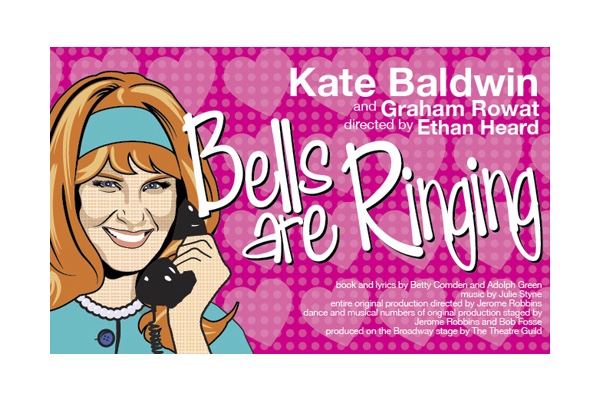Back in in the Days before Voice Mail

THE BERKSHIRES: There was a time in this country, believe it or not, when voice mail did not exist. That’s right. You called someone on the telephone and they answered or did not. Shocking? Wait until I tell you about the days before television (if Columbus only had Netflix).
Back in the 1950s, long before voice mail, people subscribed to an answering service (some doctors still use them). The answering service operators, almost all women, took calls for their client, wrote down information and delivered it to the client when he/she called for messages. It worked rather well.
Bells Are Ringing, a revival of the hit 1956 play, is the story of an answering service girl who gets too involved with her clients and winds up in the middle of one of the wackiest adventures in New York City history. Bells Are Ringing is running at the Colonial Theater in Pittsfield, Massachusetts, part of the Berkshire Theatre Group.
Bells, based loosely on the life of a real life phone service girl, that became a 1960 movie starring Dean Martin , is a charming tale about the 1950s. It is a real throwback musical, a story with an army of New Yorkers going to work riding the subway, partying, complaining, singing, dancing and even playing the horses. It is a New York play like Guys and Dolls and, like that show, is full of memorable music, quaint sub-plots, the traditional love wins over all theme and, of course, very little politics, no violence and the constant hint of sex (somebody made babies back then). The show’s solid book and lyrics were by Betty Comden and Adolph Green, with music by Jule Styne. The original production was directed by Jerome Robbins with choreography by Robbins and Bob Fosse. It has some memorable songs, such as Just in Time and The Party’s Over and brilliant choreography (the choreographer for this production is Parker Esse. The quite able director for this show is Ethan Heard).
The Colonial Theater production is a very good one, even though it is overly long at nearly three hours (a good twenty minutes could be snipped), includes a first act with no end in sight and features the strangest psychedelic style set I have ever seen.
Ella, the phone girl, becomes a part of the lives of her clients, chatting with them about their work, husbands, wives and children. She never actually meets, them, though, until one morning when writer Jeffrey Moss’ phone does not answer and he has to be up to save his job. So she runs over to his apartment and wakes him, careful not to let him know she is the phone girl. The two then fall in love and Moss tries to figure out who she is as they travel, hand in hand, to a high society party, a crowded subway (wonderful song and dance number there as the commuters bounce up and down on the train).
Back at the office, old rascal Sandor Prantz charms the phone service manager into letting him use her phone service as a disguised bookie operation for himself and the mob. .
The show is a star turn for Kate Baldwin the veteran Broadway actress who plays Ella, the phone girl. She takes over the show the minute she glides on to the stage. Baldwin is in just about every number and serves as the witty, delightful anchor of the story. She gets much help from Andrew Cristi as Francis, Joe Dellger as Sandor Prantz, Kat Nejat as Ella’s friend Phyllis, Molly Tynes as Olga and Sara Andreas as Gwynne. Graham Rowat, a fine dancer and a man with a wondrous singing voice, plays Jeffrey Moss, Ella’s boyfriend.
The show, set in 1956, has some very funny portrayals of Marlon Brando, then an emerging superstar. It pokes fun at society parties, wherever everybody plays the name dropping game and drinks too much. It also has the time honored sub plot of opportunistic, money hungry Romeo chasing an older, unsuspecting Juliet.
What is mirthful about Bells are all the aspects of life in the 1950s that you do not see anymore. Do you remember the rotary telephone at all? Long ago, before cell phones and smart phones, we spoke on a rotary phone which you held to your ear with one hand and dialed a number in circular fashion with the other. We had pay phones, too. They died with the emergence of the cell phone.
You can have a lot of fun with the show’s program. It lists all of the 1950s celebrities named in the show. You match them up with jumbled descriptions in a neat little trivia game. Come on, who was Jose Ferrer?
Going to the Colonial is a walk back in history. The lovely 800 seat theater, with two huge balconies, was built in 1903 as a legitimate stage and then became a movie theater (an old movie poster in the spacious lobby reminds you that in the 1920s movie tickets cost just a quarter). The impressive brick theater sits right in the middle of town on the old Main Street.
When you walk out of the theater, and Bells Are Ringing, you feel good about things. Isis is far away, nobody is gunned down in America’s streets, there is no cancer, people love each other and the future is bright. That’s what a good escapist 1950s musical does for you.
PRODUCTION: The play is produced by the Berkshire Theatre Group. Set Design: Reid Thompson, Costumes: David Murin, Lighting: Oliver Wason, Sound: Steve Brush. The show is choreographed by Parker Esse and directed by Ethan Heard. It runs through July 26.